Ethical Dilemmas, Sustainability Challenges in Accounting Report
VerifiedAdded on 2023/03/17
|17
|4104
|42
Report
AI Summary
This report delves into ethical dilemmas and sustainability challenges within the accounting profession. Part A focuses on ethical dilemmas, defining the concept, providing examples like Enron, WorldCom, and AIG, and exploring their backgrounds, stakeholder impacts, and links to the accounting profession, referencing IESBA guidelines. Part B shifts to sustainability, examining challenges and solutions, including the impact of the Tax Cuts and Jobs Act (TCJA) and Artificial Intelligence. The report concludes with recommendations for ethical conduct and sustainability in accounting, emphasizing the importance of ethical frameworks, regulatory oversight, and continuous improvement to ensure accurate financial reporting and long-term sustainability. The report highlights the significance of ethical practices for maintaining stakeholder trust and the overall health of the business environment.
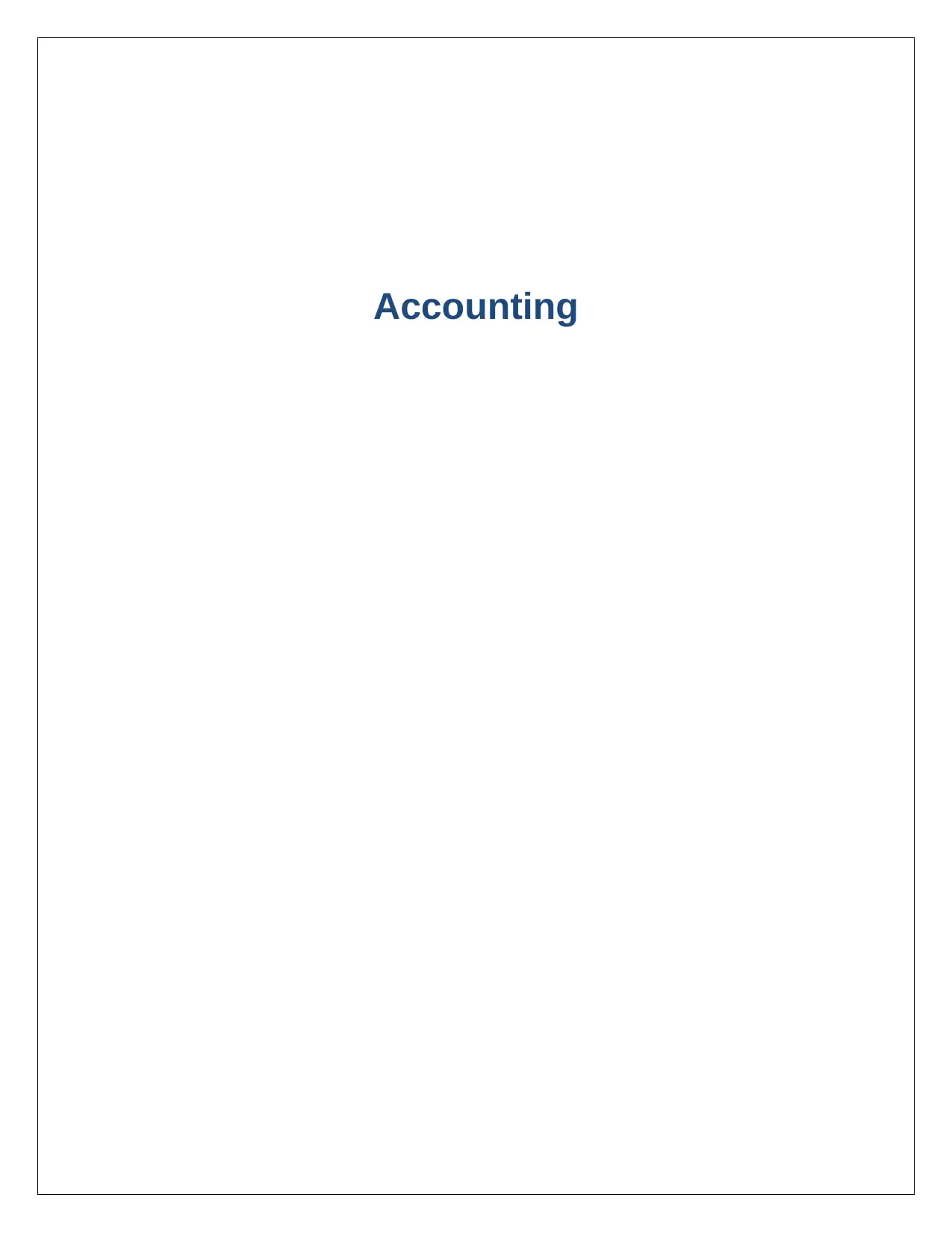
Accounting
Paraphrase This Document
Need a fresh take? Get an instant paraphrase of this document with our AI Paraphraser
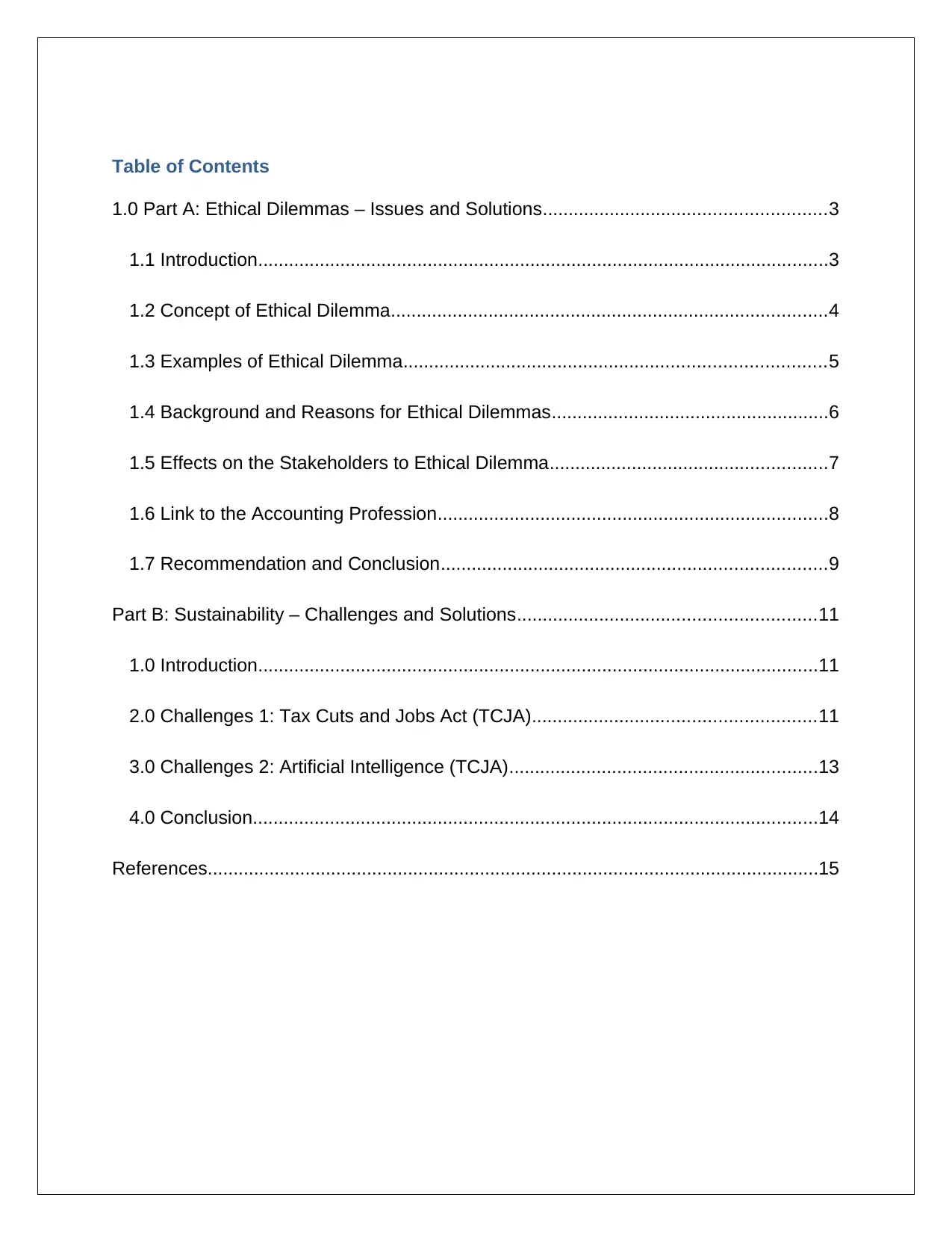
Table of Contents
1.0 Part A: Ethical Dilemmas – Issues and Solutions.......................................................3
1.1 Introduction...............................................................................................................3
1.2 Concept of Ethical Dilemma.....................................................................................4
1.3 Examples of Ethical Dilemma..................................................................................5
1.4 Background and Reasons for Ethical Dilemmas......................................................6
1.5 Effects on the Stakeholders to Ethical Dilemma......................................................7
1.6 Link to the Accounting Profession............................................................................8
1.7 Recommendation and Conclusion...........................................................................9
Part B: Sustainability – Challenges and Solutions..........................................................11
1.0 Introduction.............................................................................................................11
2.0 Challenges 1: Tax Cuts and Jobs Act (TCJA).......................................................11
3.0 Challenges 2: Artificial Intelligence (TCJA)............................................................13
4.0 Conclusion..............................................................................................................14
References.......................................................................................................................15
1.0 Part A: Ethical Dilemmas – Issues and Solutions.......................................................3
1.1 Introduction...............................................................................................................3
1.2 Concept of Ethical Dilemma.....................................................................................4
1.3 Examples of Ethical Dilemma..................................................................................5
1.4 Background and Reasons for Ethical Dilemmas......................................................6
1.5 Effects on the Stakeholders to Ethical Dilemma......................................................7
1.6 Link to the Accounting Profession............................................................................8
1.7 Recommendation and Conclusion...........................................................................9
Part B: Sustainability – Challenges and Solutions..........................................................11
1.0 Introduction.............................................................................................................11
2.0 Challenges 1: Tax Cuts and Jobs Act (TCJA).......................................................11
3.0 Challenges 2: Artificial Intelligence (TCJA)............................................................13
4.0 Conclusion..............................................................................................................14
References.......................................................................................................................15
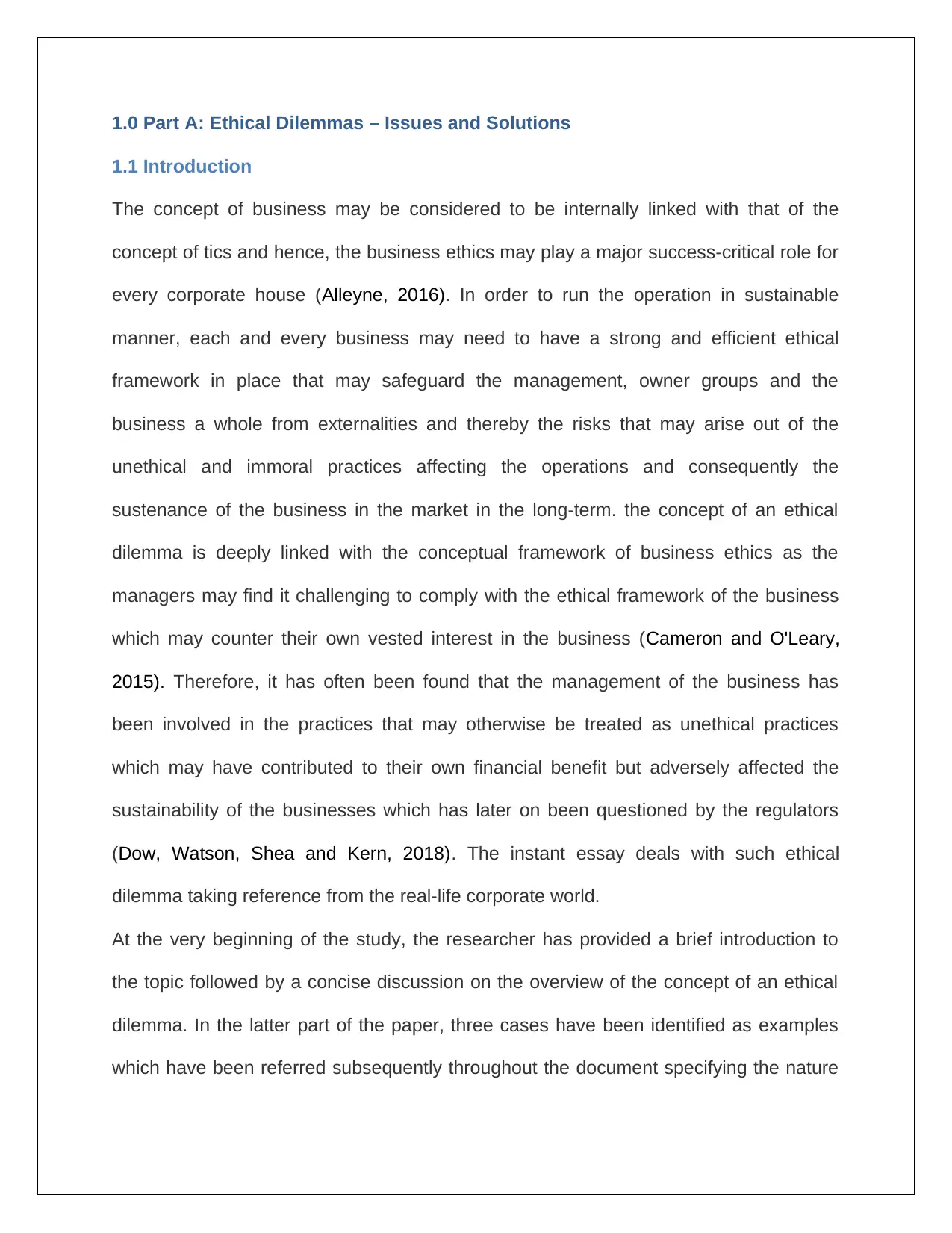
1.0 Part A: Ethical Dilemmas – Issues and Solutions
1.1 Introduction
The concept of business may be considered to be internally linked with that of the
concept of tics and hence, the business ethics may play a major success-critical role for
every corporate house (Alleyne, 2016). In order to run the operation in sustainable
manner, each and every business may need to have a strong and efficient ethical
framework in place that may safeguard the management, owner groups and the
business a whole from externalities and thereby the risks that may arise out of the
unethical and immoral practices affecting the operations and consequently the
sustenance of the business in the market in the long-term. the concept of an ethical
dilemma is deeply linked with the conceptual framework of business ethics as the
managers may find it challenging to comply with the ethical framework of the business
which may counter their own vested interest in the business (Cameron and O'Leary,
2015). Therefore, it has often been found that the management of the business has
been involved in the practices that may otherwise be treated as unethical practices
which may have contributed to their own financial benefit but adversely affected the
sustainability of the businesses which has later on been questioned by the regulators
(Dow, Watson, Shea and Kern, 2018). The instant essay deals with such ethical
dilemma taking reference from the real-life corporate world.
At the very beginning of the study, the researcher has provided a brief introduction to
the topic followed by a concise discussion on the overview of the concept of an ethical
dilemma. In the latter part of the paper, three cases have been identified as examples
which have been referred subsequently throughout the document specifying the nature
1.1 Introduction
The concept of business may be considered to be internally linked with that of the
concept of tics and hence, the business ethics may play a major success-critical role for
every corporate house (Alleyne, 2016). In order to run the operation in sustainable
manner, each and every business may need to have a strong and efficient ethical
framework in place that may safeguard the management, owner groups and the
business a whole from externalities and thereby the risks that may arise out of the
unethical and immoral practices affecting the operations and consequently the
sustenance of the business in the market in the long-term. the concept of an ethical
dilemma is deeply linked with the conceptual framework of business ethics as the
managers may find it challenging to comply with the ethical framework of the business
which may counter their own vested interest in the business (Cameron and O'Leary,
2015). Therefore, it has often been found that the management of the business has
been involved in the practices that may otherwise be treated as unethical practices
which may have contributed to their own financial benefit but adversely affected the
sustainability of the businesses which has later on been questioned by the regulators
(Dow, Watson, Shea and Kern, 2018). The instant essay deals with such ethical
dilemma taking reference from the real-life corporate world.
At the very beginning of the study, the researcher has provided a brief introduction to
the topic followed by a concise discussion on the overview of the concept of an ethical
dilemma. In the latter part of the paper, three cases have been identified as examples
which have been referred subsequently throughout the document specifying the nature
⊘ This is a preview!⊘
Do you want full access?
Subscribe today to unlock all pages.

Trusted by 1+ million students worldwide
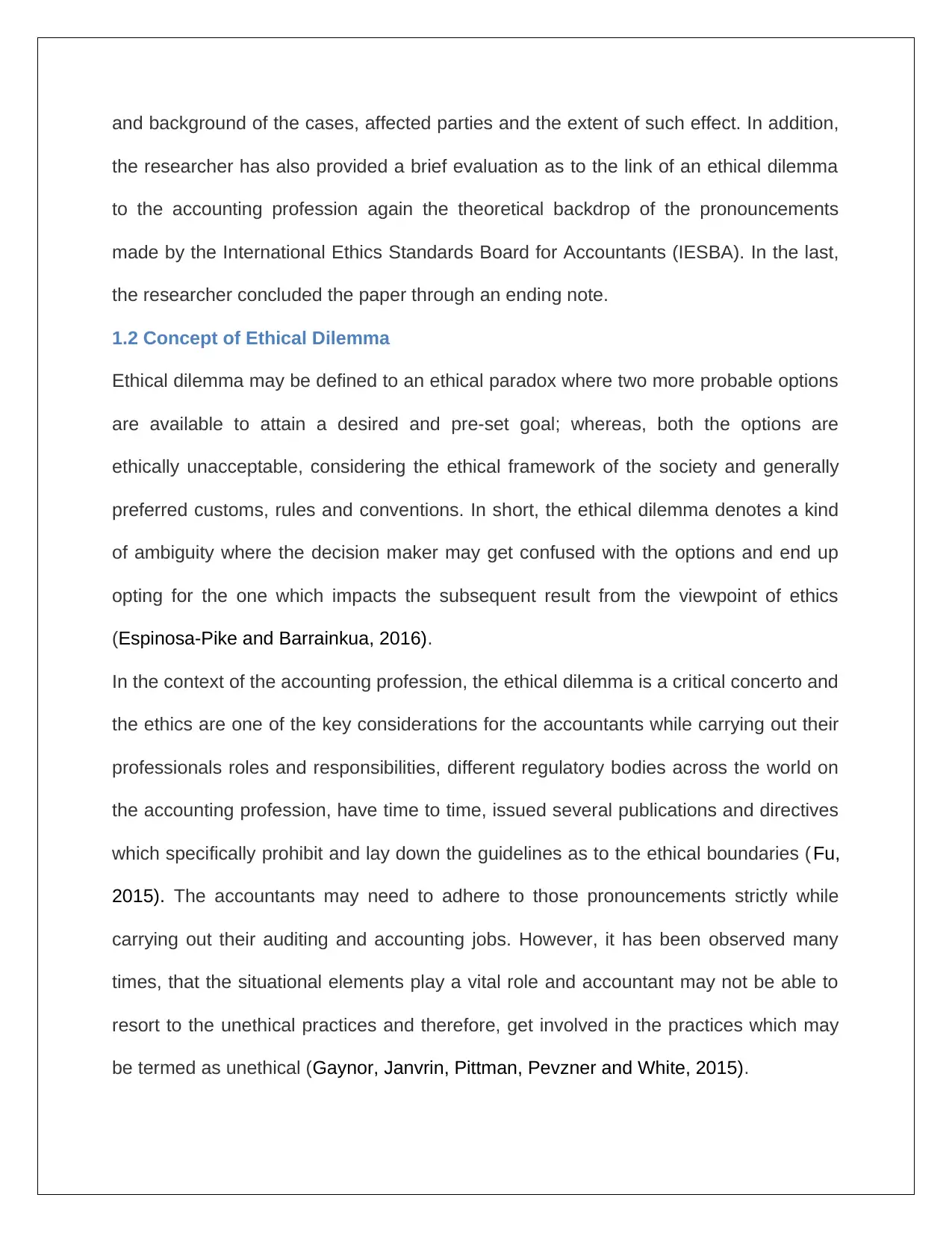
and background of the cases, affected parties and the extent of such effect. In addition,
the researcher has also provided a brief evaluation as to the link of an ethical dilemma
to the accounting profession again the theoretical backdrop of the pronouncements
made by the International Ethics Standards Board for Accountants (IESBA). In the last,
the researcher concluded the paper through an ending note.
1.2 Concept of Ethical Dilemma
Ethical dilemma may be defined to an ethical paradox where two more probable options
are available to attain a desired and pre-set goal; whereas, both the options are
ethically unacceptable, considering the ethical framework of the society and generally
preferred customs, rules and conventions. In short, the ethical dilemma denotes a kind
of ambiguity where the decision maker may get confused with the options and end up
opting for the one which impacts the subsequent result from the viewpoint of ethics
(Espinosa-Pike and Barrainkua, 2016).
In the context of the accounting profession, the ethical dilemma is a critical concerto and
the ethics are one of the key considerations for the accountants while carrying out their
professionals roles and responsibilities, different regulatory bodies across the world on
the accounting profession, have time to time, issued several publications and directives
which specifically prohibit and lay down the guidelines as to the ethical boundaries ( Fu,
2015). The accountants may need to adhere to those pronouncements strictly while
carrying out their auditing and accounting jobs. However, it has been observed many
times, that the situational elements play a vital role and accountant may not be able to
resort to the unethical practices and therefore, get involved in the practices which may
be termed as unethical (Gaynor, Janvrin, Pittman, Pevzner and White, 2015).
the researcher has also provided a brief evaluation as to the link of an ethical dilemma
to the accounting profession again the theoretical backdrop of the pronouncements
made by the International Ethics Standards Board for Accountants (IESBA). In the last,
the researcher concluded the paper through an ending note.
1.2 Concept of Ethical Dilemma
Ethical dilemma may be defined to an ethical paradox where two more probable options
are available to attain a desired and pre-set goal; whereas, both the options are
ethically unacceptable, considering the ethical framework of the society and generally
preferred customs, rules and conventions. In short, the ethical dilemma denotes a kind
of ambiguity where the decision maker may get confused with the options and end up
opting for the one which impacts the subsequent result from the viewpoint of ethics
(Espinosa-Pike and Barrainkua, 2016).
In the context of the accounting profession, the ethical dilemma is a critical concerto and
the ethics are one of the key considerations for the accountants while carrying out their
professionals roles and responsibilities, different regulatory bodies across the world on
the accounting profession, have time to time, issued several publications and directives
which specifically prohibit and lay down the guidelines as to the ethical boundaries ( Fu,
2015). The accountants may need to adhere to those pronouncements strictly while
carrying out their auditing and accounting jobs. However, it has been observed many
times, that the situational elements play a vital role and accountant may not be able to
resort to the unethical practices and therefore, get involved in the practices which may
be termed as unethical (Gaynor, Janvrin, Pittman, Pevzner and White, 2015).
Paraphrase This Document
Need a fresh take? Get an instant paraphrase of this document with our AI Paraphraser
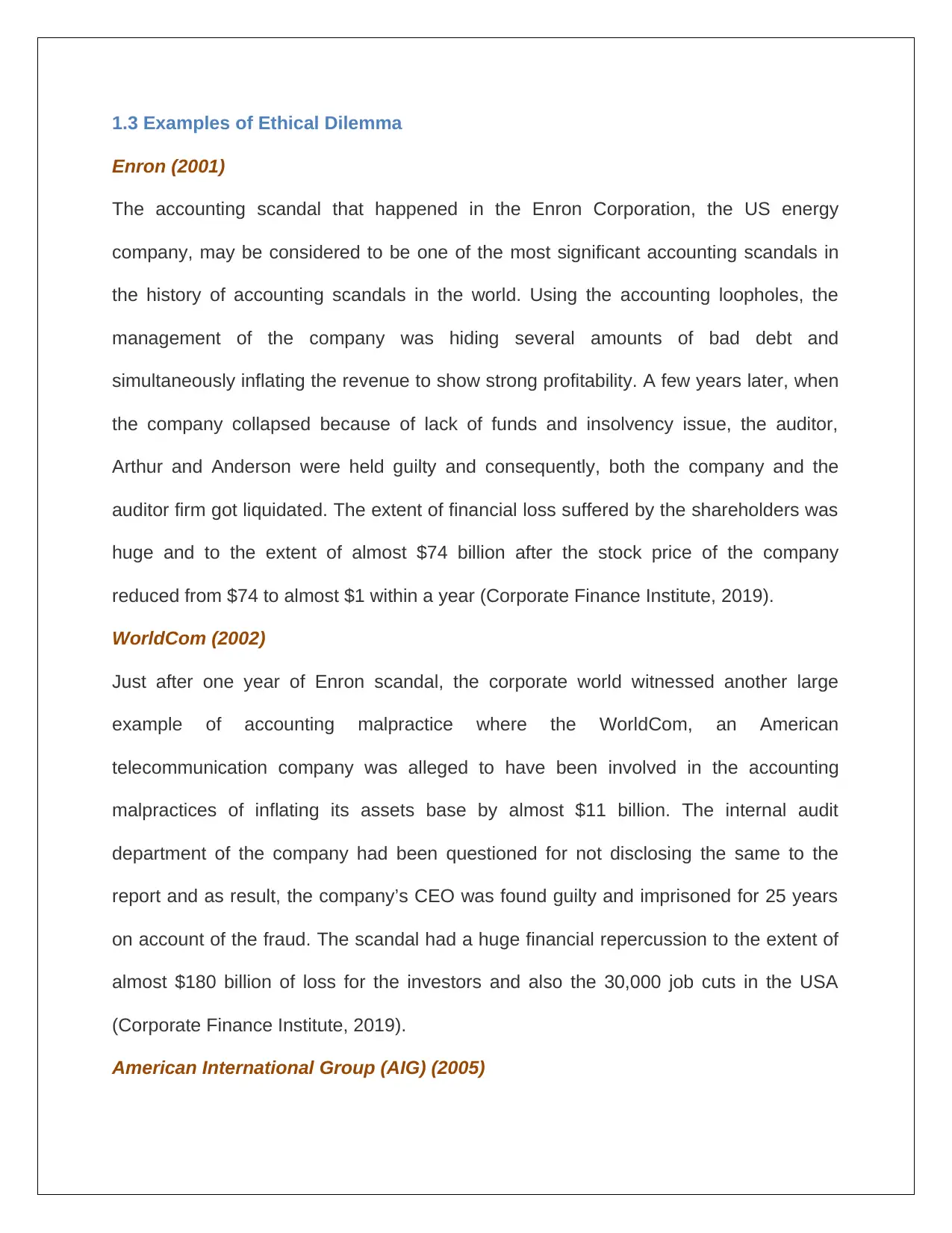
1.3 Examples of Ethical Dilemma
Enron (2001)
The accounting scandal that happened in the Enron Corporation, the US energy
company, may be considered to be one of the most significant accounting scandals in
the history of accounting scandals in the world. Using the accounting loopholes, the
management of the company was hiding several amounts of bad debt and
simultaneously inflating the revenue to show strong profitability. A few years later, when
the company collapsed because of lack of funds and insolvency issue, the auditor,
Arthur and Anderson were held guilty and consequently, both the company and the
auditor firm got liquidated. The extent of financial loss suffered by the shareholders was
huge and to the extent of almost $74 billion after the stock price of the company
reduced from $74 to almost $1 within a year (Corporate Finance Institute, 2019).
WorldCom (2002)
Just after one year of Enron scandal, the corporate world witnessed another large
example of accounting malpractice where the WorldCom, an American
telecommunication company was alleged to have been involved in the accounting
malpractices of inflating its assets base by almost $11 billion. The internal audit
department of the company had been questioned for not disclosing the same to the
report and as result, the company’s CEO was found guilty and imprisoned for 25 years
on account of the fraud. The scandal had a huge financial repercussion to the extent of
almost $180 billion of loss for the investors and also the 30,000 job cuts in the USA
(Corporate Finance Institute, 2019).
American International Group (AIG) (2005)
Enron (2001)
The accounting scandal that happened in the Enron Corporation, the US energy
company, may be considered to be one of the most significant accounting scandals in
the history of accounting scandals in the world. Using the accounting loopholes, the
management of the company was hiding several amounts of bad debt and
simultaneously inflating the revenue to show strong profitability. A few years later, when
the company collapsed because of lack of funds and insolvency issue, the auditor,
Arthur and Anderson were held guilty and consequently, both the company and the
auditor firm got liquidated. The extent of financial loss suffered by the shareholders was
huge and to the extent of almost $74 billion after the stock price of the company
reduced from $74 to almost $1 within a year (Corporate Finance Institute, 2019).
WorldCom (2002)
Just after one year of Enron scandal, the corporate world witnessed another large
example of accounting malpractice where the WorldCom, an American
telecommunication company was alleged to have been involved in the accounting
malpractices of inflating its assets base by almost $11 billion. The internal audit
department of the company had been questioned for not disclosing the same to the
report and as result, the company’s CEO was found guilty and imprisoned for 25 years
on account of the fraud. The scandal had a huge financial repercussion to the extent of
almost $180 billion of loss for the investors and also the 30,000 job cuts in the USA
(Corporate Finance Institute, 2019).
American International Group (AIG) (2005)
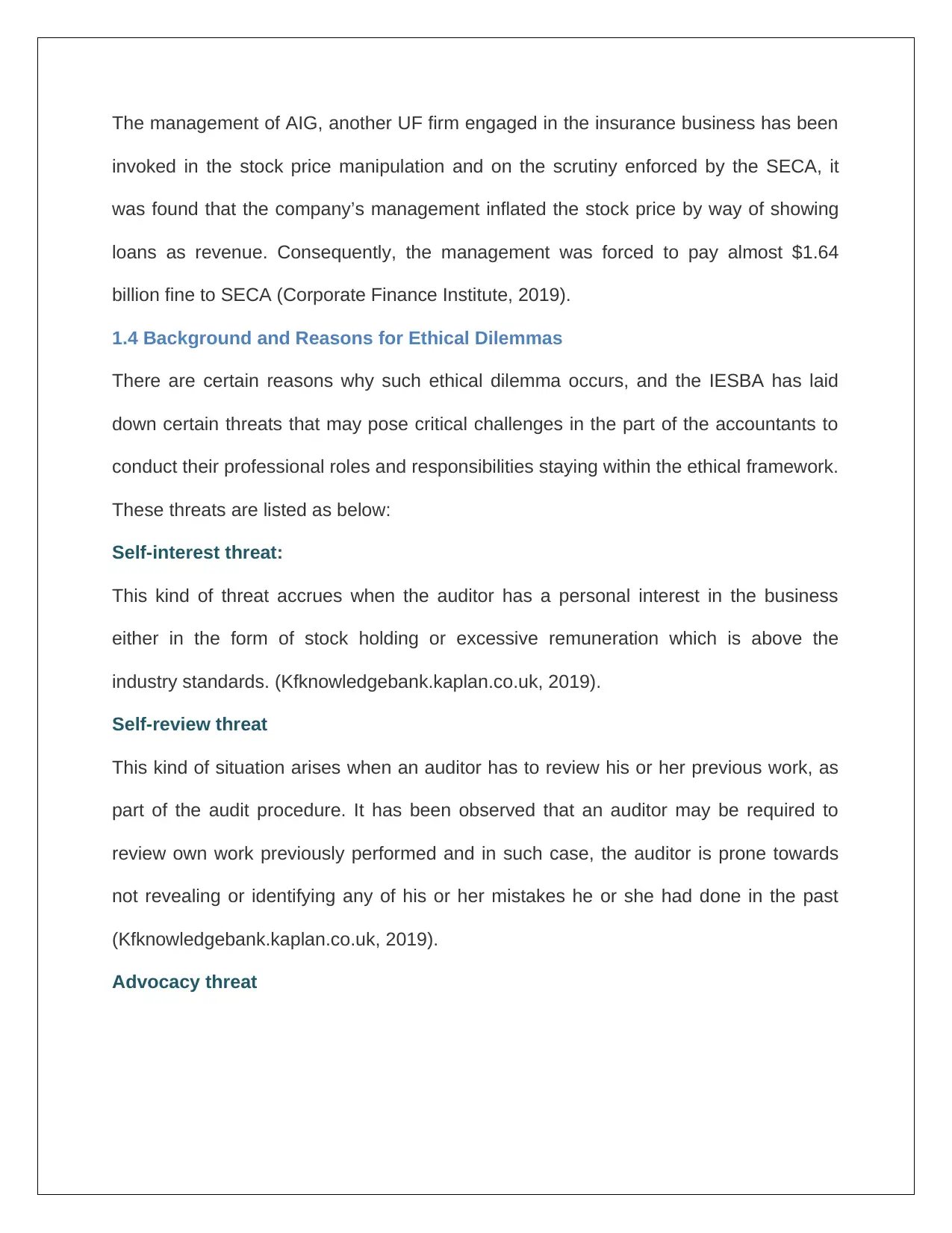
The management of AIG, another UF firm engaged in the insurance business has been
invoked in the stock price manipulation and on the scrutiny enforced by the SECA, it
was found that the company’s management inflated the stock price by way of showing
loans as revenue. Consequently, the management was forced to pay almost $1.64
billion fine to SECA (Corporate Finance Institute, 2019).
1.4 Background and Reasons for Ethical Dilemmas
There are certain reasons why such ethical dilemma occurs, and the IESBA has laid
down certain threats that may pose critical challenges in the part of the accountants to
conduct their professional roles and responsibilities staying within the ethical framework.
These threats are listed as below:
Self-interest threat:
This kind of threat accrues when the auditor has a personal interest in the business
either in the form of stock holding or excessive remuneration which is above the
industry standards. (Kfknowledgebank.kaplan.co.uk, 2019).
Self-review threat
This kind of situation arises when an auditor has to review his or her previous work, as
part of the audit procedure. It has been observed that an auditor may be required to
review own work previously performed and in such case, the auditor is prone towards
not revealing or identifying any of his or her mistakes he or she had done in the past
(Kfknowledgebank.kaplan.co.uk, 2019).
Advocacy threat
invoked in the stock price manipulation and on the scrutiny enforced by the SECA, it
was found that the company’s management inflated the stock price by way of showing
loans as revenue. Consequently, the management was forced to pay almost $1.64
billion fine to SECA (Corporate Finance Institute, 2019).
1.4 Background and Reasons for Ethical Dilemmas
There are certain reasons why such ethical dilemma occurs, and the IESBA has laid
down certain threats that may pose critical challenges in the part of the accountants to
conduct their professional roles and responsibilities staying within the ethical framework.
These threats are listed as below:
Self-interest threat:
This kind of threat accrues when the auditor has a personal interest in the business
either in the form of stock holding or excessive remuneration which is above the
industry standards. (Kfknowledgebank.kaplan.co.uk, 2019).
Self-review threat
This kind of situation arises when an auditor has to review his or her previous work, as
part of the audit procedure. It has been observed that an auditor may be required to
review own work previously performed and in such case, the auditor is prone towards
not revealing or identifying any of his or her mistakes he or she had done in the past
(Kfknowledgebank.kaplan.co.uk, 2019).
Advocacy threat
⊘ This is a preview!⊘
Do you want full access?
Subscribe today to unlock all pages.

Trusted by 1+ million students worldwide
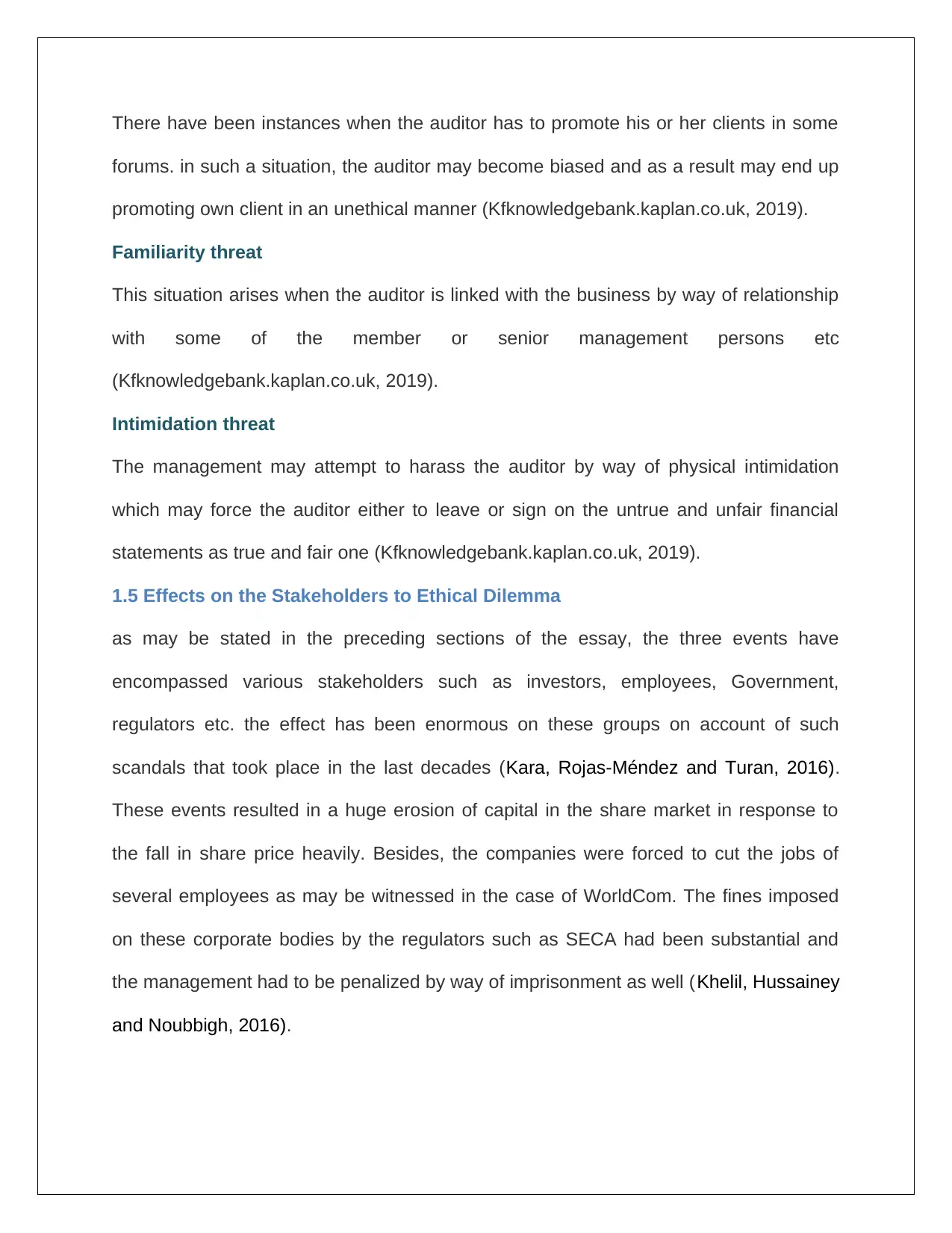
There have been instances when the auditor has to promote his or her clients in some
forums. in such a situation, the auditor may become biased and as a result may end up
promoting own client in an unethical manner (Kfknowledgebank.kaplan.co.uk, 2019).
Familiarity threat
This situation arises when the auditor is linked with the business by way of relationship
with some of the member or senior management persons etc
(Kfknowledgebank.kaplan.co.uk, 2019).
Intimidation threat
The management may attempt to harass the auditor by way of physical intimidation
which may force the auditor either to leave or sign on the untrue and unfair financial
statements as true and fair one (Kfknowledgebank.kaplan.co.uk, 2019).
1.5 Effects on the Stakeholders to Ethical Dilemma
as may be stated in the preceding sections of the essay, the three events have
encompassed various stakeholders such as investors, employees, Government,
regulators etc. the effect has been enormous on these groups on account of such
scandals that took place in the last decades (Kara, Rojas-Méndez and Turan, 2016).
These events resulted in a huge erosion of capital in the share market in response to
the fall in share price heavily. Besides, the companies were forced to cut the jobs of
several employees as may be witnessed in the case of WorldCom. The fines imposed
on these corporate bodies by the regulators such as SECA had been substantial and
the management had to be penalized by way of imprisonment as well (Khelil, Hussainey
and Noubbigh, 2016).
forums. in such a situation, the auditor may become biased and as a result may end up
promoting own client in an unethical manner (Kfknowledgebank.kaplan.co.uk, 2019).
Familiarity threat
This situation arises when the auditor is linked with the business by way of relationship
with some of the member or senior management persons etc
(Kfknowledgebank.kaplan.co.uk, 2019).
Intimidation threat
The management may attempt to harass the auditor by way of physical intimidation
which may force the auditor either to leave or sign on the untrue and unfair financial
statements as true and fair one (Kfknowledgebank.kaplan.co.uk, 2019).
1.5 Effects on the Stakeholders to Ethical Dilemma
as may be stated in the preceding sections of the essay, the three events have
encompassed various stakeholders such as investors, employees, Government,
regulators etc. the effect has been enormous on these groups on account of such
scandals that took place in the last decades (Kara, Rojas-Méndez and Turan, 2016).
These events resulted in a huge erosion of capital in the share market in response to
the fall in share price heavily. Besides, the companies were forced to cut the jobs of
several employees as may be witnessed in the case of WorldCom. The fines imposed
on these corporate bodies by the regulators such as SECA had been substantial and
the management had to be penalized by way of imprisonment as well (Khelil, Hussainey
and Noubbigh, 2016).
Paraphrase This Document
Need a fresh take? Get an instant paraphrase of this document with our AI Paraphraser
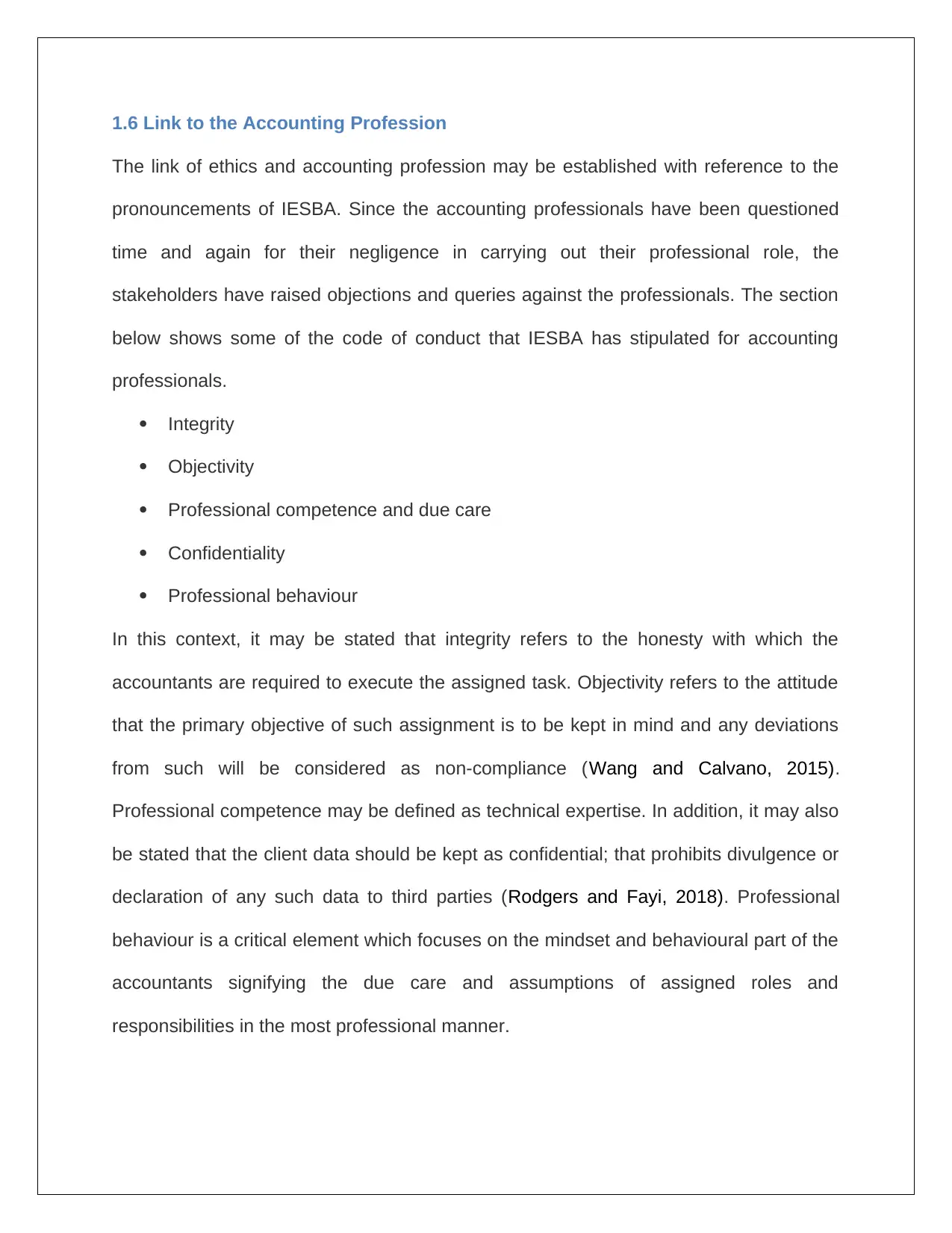
1.6 Link to the Accounting Profession
The link of ethics and accounting profession may be established with reference to the
pronouncements of IESBA. Since the accounting professionals have been questioned
time and again for their negligence in carrying out their professional role, the
stakeholders have raised objections and queries against the professionals. The section
below shows some of the code of conduct that IESBA has stipulated for accounting
professionals.
Integrity
Objectivity
Professional competence and due care
Confidentiality
Professional behaviour
In this context, it may be stated that integrity refers to the honesty with which the
accountants are required to execute the assigned task. Objectivity refers to the attitude
that the primary objective of such assignment is to be kept in mind and any deviations
from such will be considered as non-compliance (Wang and Calvano, 2015).
Professional competence may be defined as technical expertise. In addition, it may also
be stated that the client data should be kept as confidential; that prohibits divulgence or
declaration of any such data to third parties (Rodgers and Fayi, 2018). Professional
behaviour is a critical element which focuses on the mindset and behavioural part of the
accountants signifying the due care and assumptions of assigned roles and
responsibilities in the most professional manner.
The link of ethics and accounting profession may be established with reference to the
pronouncements of IESBA. Since the accounting professionals have been questioned
time and again for their negligence in carrying out their professional role, the
stakeholders have raised objections and queries against the professionals. The section
below shows some of the code of conduct that IESBA has stipulated for accounting
professionals.
Integrity
Objectivity
Professional competence and due care
Confidentiality
Professional behaviour
In this context, it may be stated that integrity refers to the honesty with which the
accountants are required to execute the assigned task. Objectivity refers to the attitude
that the primary objective of such assignment is to be kept in mind and any deviations
from such will be considered as non-compliance (Wang and Calvano, 2015).
Professional competence may be defined as technical expertise. In addition, it may also
be stated that the client data should be kept as confidential; that prohibits divulgence or
declaration of any such data to third parties (Rodgers and Fayi, 2018). Professional
behaviour is a critical element which focuses on the mindset and behavioural part of the
accountants signifying the due care and assumptions of assigned roles and
responsibilities in the most professional manner.
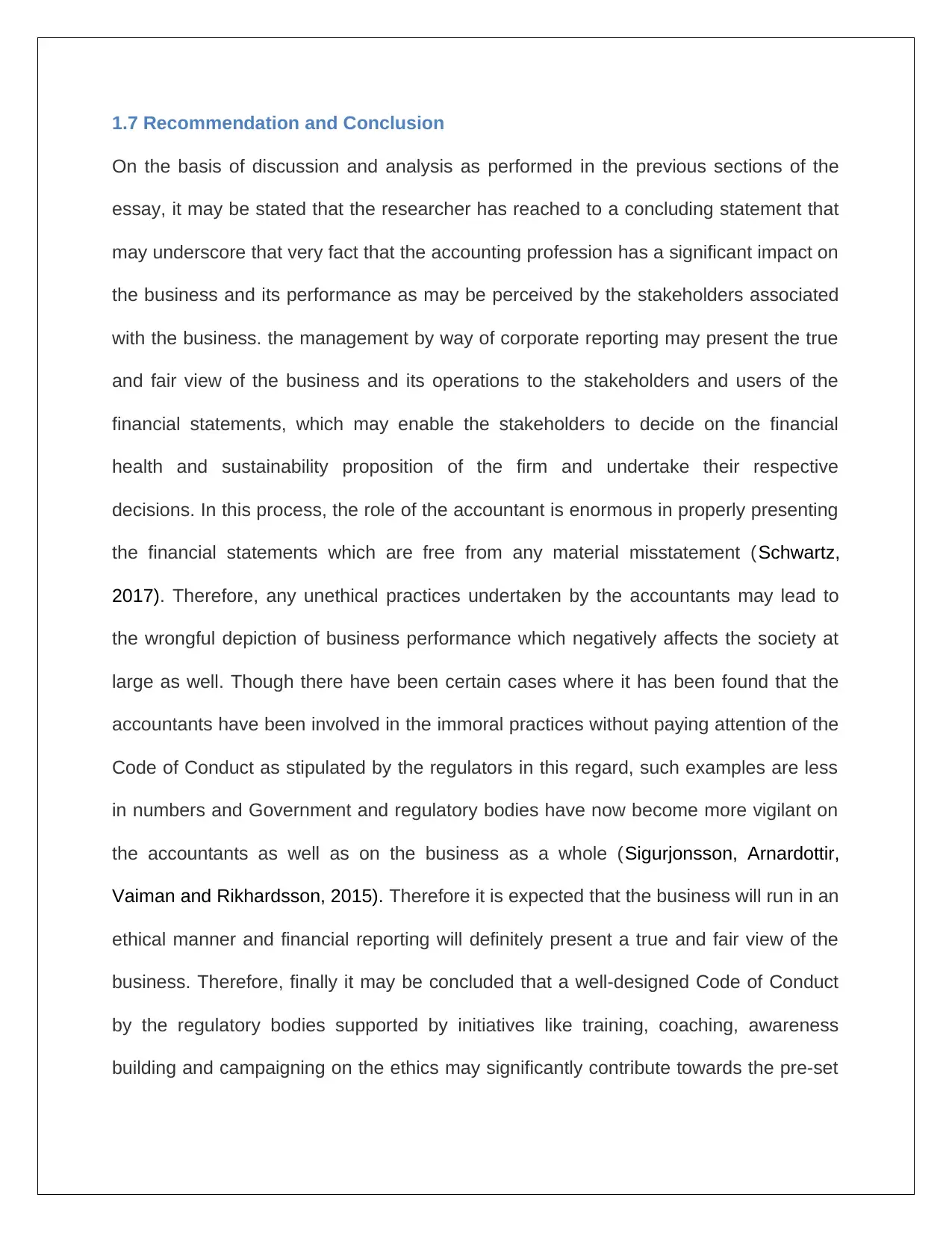
1.7 Recommendation and Conclusion
On the basis of discussion and analysis as performed in the previous sections of the
essay, it may be stated that the researcher has reached to a concluding statement that
may underscore that very fact that the accounting profession has a significant impact on
the business and its performance as may be perceived by the stakeholders associated
with the business. the management by way of corporate reporting may present the true
and fair view of the business and its operations to the stakeholders and users of the
financial statements, which may enable the stakeholders to decide on the financial
health and sustainability proposition of the firm and undertake their respective
decisions. In this process, the role of the accountant is enormous in properly presenting
the financial statements which are free from any material misstatement (Schwartz,
2017). Therefore, any unethical practices undertaken by the accountants may lead to
the wrongful depiction of business performance which negatively affects the society at
large as well. Though there have been certain cases where it has been found that the
accountants have been involved in the immoral practices without paying attention of the
Code of Conduct as stipulated by the regulators in this regard, such examples are less
in numbers and Government and regulatory bodies have now become more vigilant on
the accountants as well as on the business as a whole (Sigurjonsson, Arnardottir,
Vaiman and Rikhardsson, 2015). Therefore it is expected that the business will run in an
ethical manner and financial reporting will definitely present a true and fair view of the
business. Therefore, finally it may be concluded that a well-designed Code of Conduct
by the regulatory bodies supported by initiatives like training, coaching, awareness
building and campaigning on the ethics may significantly contribute towards the pre-set
On the basis of discussion and analysis as performed in the previous sections of the
essay, it may be stated that the researcher has reached to a concluding statement that
may underscore that very fact that the accounting profession has a significant impact on
the business and its performance as may be perceived by the stakeholders associated
with the business. the management by way of corporate reporting may present the true
and fair view of the business and its operations to the stakeholders and users of the
financial statements, which may enable the stakeholders to decide on the financial
health and sustainability proposition of the firm and undertake their respective
decisions. In this process, the role of the accountant is enormous in properly presenting
the financial statements which are free from any material misstatement (Schwartz,
2017). Therefore, any unethical practices undertaken by the accountants may lead to
the wrongful depiction of business performance which negatively affects the society at
large as well. Though there have been certain cases where it has been found that the
accountants have been involved in the immoral practices without paying attention of the
Code of Conduct as stipulated by the regulators in this regard, such examples are less
in numbers and Government and regulatory bodies have now become more vigilant on
the accountants as well as on the business as a whole (Sigurjonsson, Arnardottir,
Vaiman and Rikhardsson, 2015). Therefore it is expected that the business will run in an
ethical manner and financial reporting will definitely present a true and fair view of the
business. Therefore, finally it may be concluded that a well-designed Code of Conduct
by the regulatory bodies supported by initiatives like training, coaching, awareness
building and campaigning on the ethics may significantly contribute towards the pre-set
⊘ This is a preview!⊘
Do you want full access?
Subscribe today to unlock all pages.

Trusted by 1+ million students worldwide
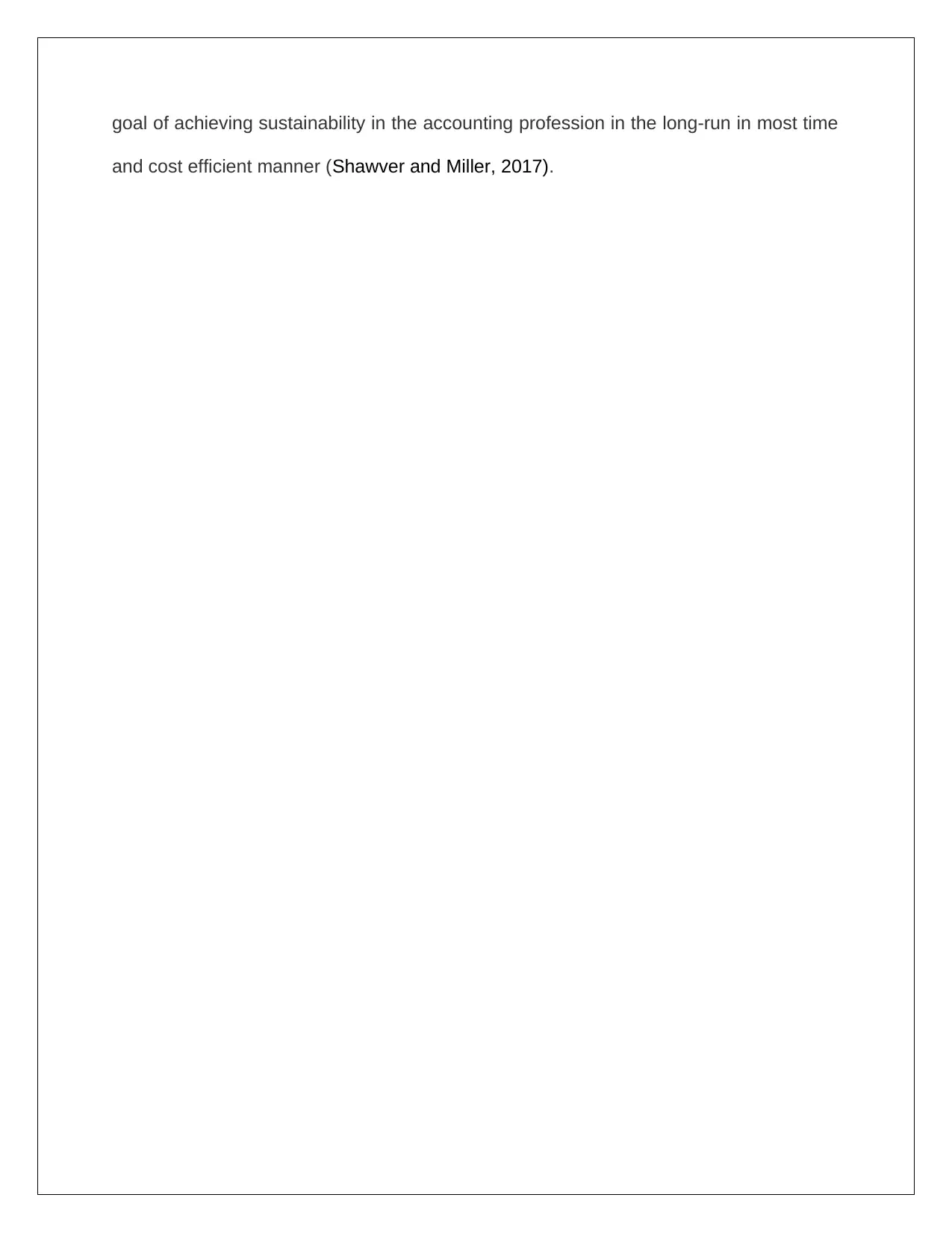
goal of achieving sustainability in the accounting profession in the long-run in most time
and cost efficient manner (Shawver and Miller, 2017).
and cost efficient manner (Shawver and Miller, 2017).
Paraphrase This Document
Need a fresh take? Get an instant paraphrase of this document with our AI Paraphraser
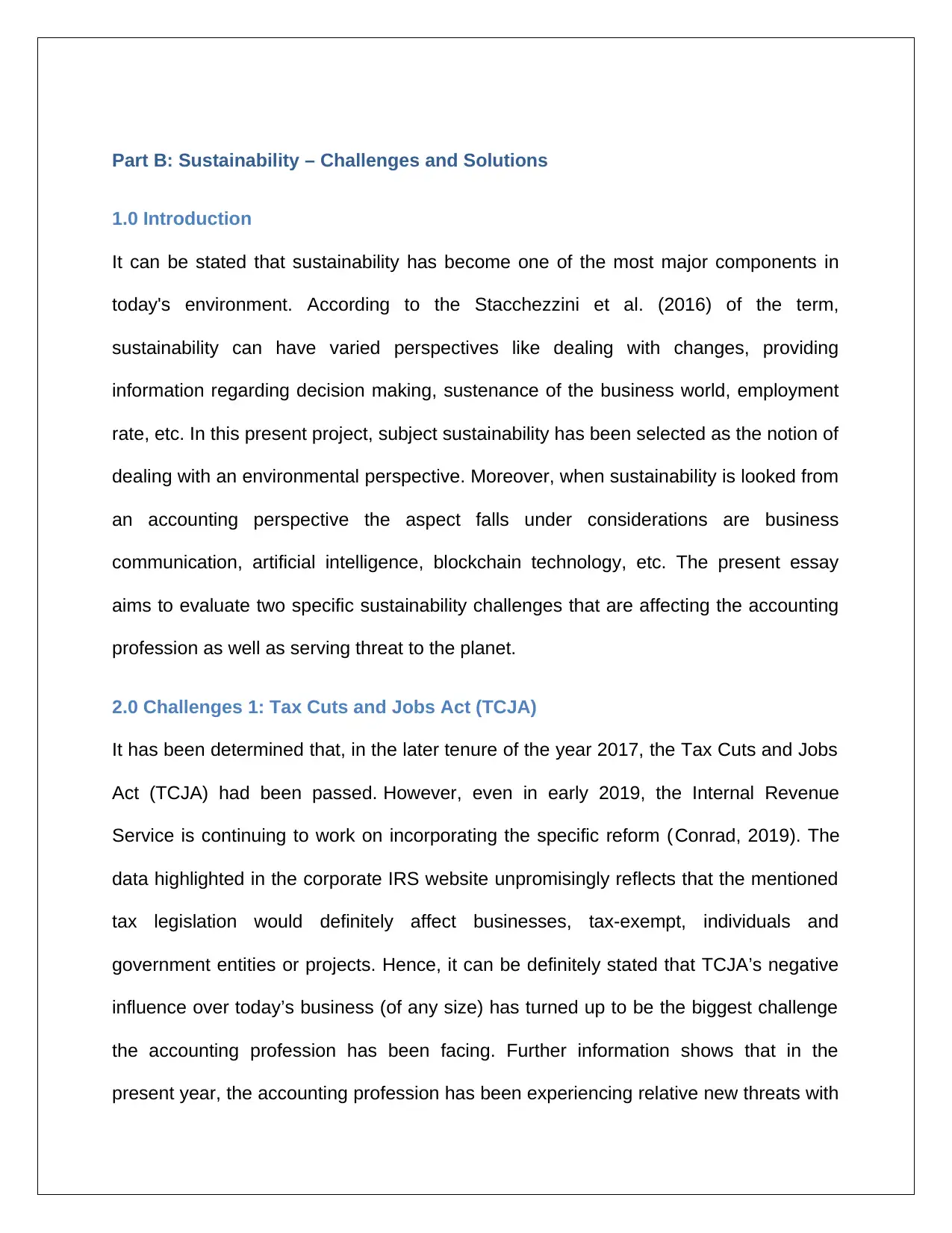
Part B: Sustainability – Challenges and Solutions
1.0 Introduction
It can be stated that sustainability has become one of the most major components in
today's environment. According to the Stacchezzini et al. (2016) of the term,
sustainability can have varied perspectives like dealing with changes, providing
information regarding decision making, sustenance of the business world, employment
rate, etc. In this present project, subject sustainability has been selected as the notion of
dealing with an environmental perspective. Moreover, when sustainability is looked from
an accounting perspective the aspect falls under considerations are business
communication, artificial intelligence, blockchain technology, etc. The present essay
aims to evaluate two specific sustainability challenges that are affecting the accounting
profession as well as serving threat to the planet.
2.0 Challenges 1: Tax Cuts and Jobs Act (TCJA)
It has been determined that, in the later tenure of the year 2017, the Tax Cuts and Jobs
Act (TCJA) had been passed. However, even in early 2019, the Internal Revenue
Service is continuing to work on incorporating the specific reform (Conrad, 2019). The
data highlighted in the corporate IRS website unpromisingly reflects that the mentioned
tax legislation would definitely affect businesses, tax-exempt, individuals and
government entities or projects. Hence, it can be definitely stated that TCJA’s negative
influence over today’s business (of any size) has turned up to be the biggest challenge
the accounting profession has been facing. Further information shows that in the
present year, the accounting profession has been experiencing relative new threats with
1.0 Introduction
It can be stated that sustainability has become one of the most major components in
today's environment. According to the Stacchezzini et al. (2016) of the term,
sustainability can have varied perspectives like dealing with changes, providing
information regarding decision making, sustenance of the business world, employment
rate, etc. In this present project, subject sustainability has been selected as the notion of
dealing with an environmental perspective. Moreover, when sustainability is looked from
an accounting perspective the aspect falls under considerations are business
communication, artificial intelligence, blockchain technology, etc. The present essay
aims to evaluate two specific sustainability challenges that are affecting the accounting
profession as well as serving threat to the planet.
2.0 Challenges 1: Tax Cuts and Jobs Act (TCJA)
It has been determined that, in the later tenure of the year 2017, the Tax Cuts and Jobs
Act (TCJA) had been passed. However, even in early 2019, the Internal Revenue
Service is continuing to work on incorporating the specific reform (Conrad, 2019). The
data highlighted in the corporate IRS website unpromisingly reflects that the mentioned
tax legislation would definitely affect businesses, tax-exempt, individuals and
government entities or projects. Hence, it can be definitely stated that TCJA’s negative
influence over today’s business (of any size) has turned up to be the biggest challenge
the accounting profession has been facing. Further information shows that in the
present year, the accounting profession has been experiencing relative new threats with
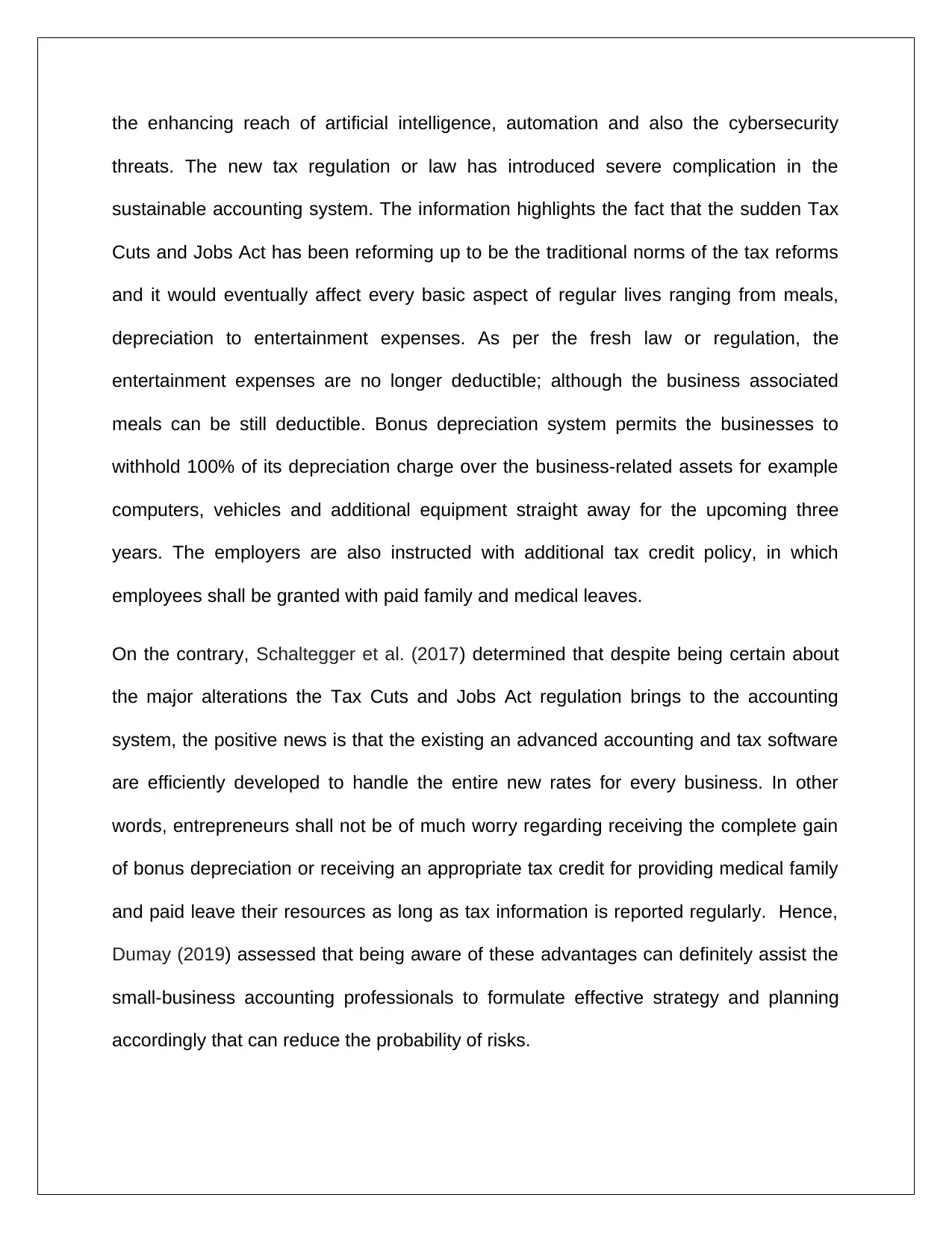
the enhancing reach of artificial intelligence, automation and also the cybersecurity
threats. The new tax regulation or law has introduced severe complication in the
sustainable accounting system. The information highlights the fact that the sudden Tax
Cuts and Jobs Act has been reforming up to be the traditional norms of the tax reforms
and it would eventually affect every basic aspect of regular lives ranging from meals,
depreciation to entertainment expenses. As per the fresh law or regulation, the
entertainment expenses are no longer deductible; although the business associated
meals can be still deductible. Bonus depreciation system permits the businesses to
withhold 100% of its depreciation charge over the business-related assets for example
computers, vehicles and additional equipment straight away for the upcoming three
years. The employers are also instructed with additional tax credit policy, in which
employees shall be granted with paid family and medical leaves.
On the contrary, Schaltegger et al. (2017) determined that despite being certain about
the major alterations the Tax Cuts and Jobs Act regulation brings to the accounting
system, the positive news is that the existing an advanced accounting and tax software
are efficiently developed to handle the entire new rates for every business. In other
words, entrepreneurs shall not be of much worry regarding receiving the complete gain
of bonus depreciation or receiving an appropriate tax credit for providing medical family
and paid leave their resources as long as tax information is reported regularly. Hence,
Dumay (2019) assessed that being aware of these advantages can definitely assist the
small-business accounting professionals to formulate effective strategy and planning
accordingly that can reduce the probability of risks.
threats. The new tax regulation or law has introduced severe complication in the
sustainable accounting system. The information highlights the fact that the sudden Tax
Cuts and Jobs Act has been reforming up to be the traditional norms of the tax reforms
and it would eventually affect every basic aspect of regular lives ranging from meals,
depreciation to entertainment expenses. As per the fresh law or regulation, the
entertainment expenses are no longer deductible; although the business associated
meals can be still deductible. Bonus depreciation system permits the businesses to
withhold 100% of its depreciation charge over the business-related assets for example
computers, vehicles and additional equipment straight away for the upcoming three
years. The employers are also instructed with additional tax credit policy, in which
employees shall be granted with paid family and medical leaves.
On the contrary, Schaltegger et al. (2017) determined that despite being certain about
the major alterations the Tax Cuts and Jobs Act regulation brings to the accounting
system, the positive news is that the existing an advanced accounting and tax software
are efficiently developed to handle the entire new rates for every business. In other
words, entrepreneurs shall not be of much worry regarding receiving the complete gain
of bonus depreciation or receiving an appropriate tax credit for providing medical family
and paid leave their resources as long as tax information is reported regularly. Hence,
Dumay (2019) assessed that being aware of these advantages can definitely assist the
small-business accounting professionals to formulate effective strategy and planning
accordingly that can reduce the probability of risks.
⊘ This is a preview!⊘
Do you want full access?
Subscribe today to unlock all pages.

Trusted by 1+ million students worldwide
1 out of 17
Related Documents
Your All-in-One AI-Powered Toolkit for Academic Success.
+13062052269
info@desklib.com
Available 24*7 on WhatsApp / Email
![[object Object]](/_next/static/media/star-bottom.7253800d.svg)
Unlock your academic potential
Copyright © 2020–2025 A2Z Services. All Rights Reserved. Developed and managed by ZUCOL.




